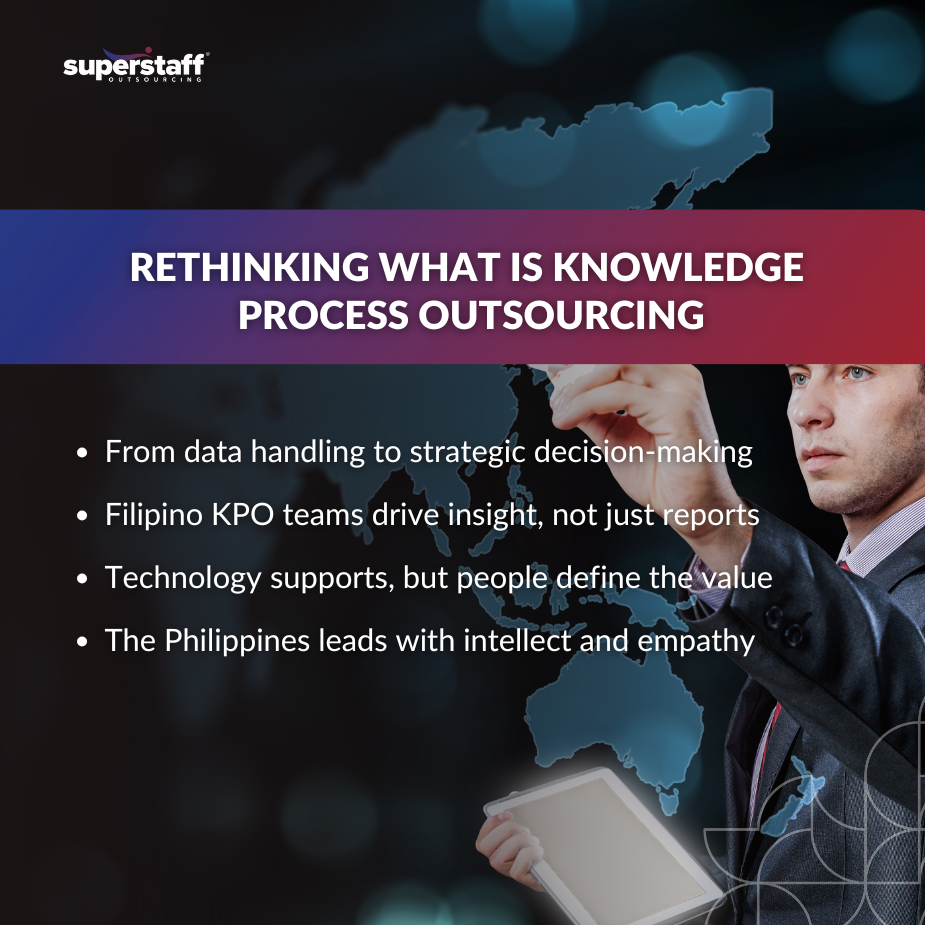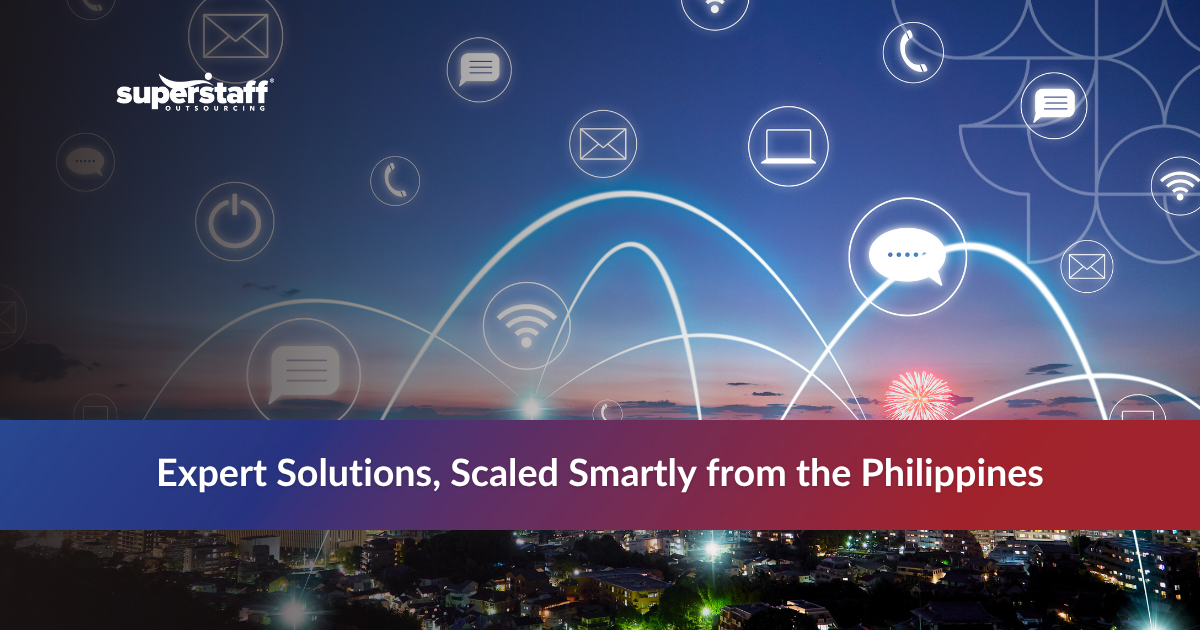
Over the years, the question “what is knowledge process outsourcing” has evolved from being about data management to representing a strategic and analytical discipline. It’s no longer limited to repetitive work but now focuses on solving complex problems and driving innovation.
The Philippines, long recognized for its excellence in customer service, is now leading the shift toward research-driven, analytical, and AI-assisted KPO services.
At the center of this transformation is a new generation of Filipino professionals—a “thinking workforce” combining intellect, empathy, and digital expertise that is redefining how the world views outsourcing.
The Evolution of KPO: From Process Execution to Knowledge Creation
The story of “what is knowledge process outsourcing” began as an extension of the BPO industry, designed to handle more specialized and knowledge-intensive functions such as research, documentation, and analytics.
Initially, it was about executing processes efficiently and cost-effectively. But as industries evolved, so did expectations. Companies began looking for outsourcing partners who could think critically, interpret data, and generate insights rather than just follow instructions.
Today, understanding “what is knowledge process outsourcing” means recognizing its role as a strategic function that empowers businesses to make smarter decisions. Filipino KPO professionals now help global firms analyze market trends, extract insights, and turn information into foresight. The Philippines has shifted from being a back-office destination to a global hub of strategic intelligence and creative problem-solving.
What was once seen as simple information support is now an engine for business innovation. Around the world, companies are realizing that asking “what is knowledge process outsourcing” is really asking how intelligence can be scaled—and the Philippines is providing that answer.
Why the Philippines Is Redefining the Global Standard for KPO Services
When business leaders explore “what is knowledge process outsourcing,” they often look to the Philippines for inspiration. The country has built its reputation on exceptional communication skills, analytical thinking, and cultural adaptability. Filipino professionals bring not just technical expertise but also empathy and perspective to every project, making them indispensable partners for complex, high-value KPO functions.
The academic foundation of Filipino workers plays a major role in this success. The country’s Western-influenced education system nurtures logical reasoning and creative thought. This mix allows professionals to approach challenges with both critical analysis and human understanding. For this reason, KPO in the Philippines has evolved from process execution to strategic contribution.
Equally important is the nation’s cultural fluency. Filipino professionals understand context and tone, making collaboration with international clients seamless. That emotional intelligence—combined with technical skill—is what makes KPO companies in the Philippines trusted partners for innovation and insight.
The Rise of the Thinking Workforce Mindset in the Philippines

The growing relevance of “what is knowledge process outsourcing” highlights the rise of a thinking workforce. In the Philippines, professionals are no longer confined to executing instructions—they now shape the ideas that drive global progress. This evolution shows a shift from viewing outsourcing as a labor function to recognizing it as a thinking partnership.
Filipino analysts, researchers, and consultants approach their work with curiosity and creativity. They go beyond simply reporting data; they find the stories within it. Whether in market intelligence, finance, or technology, this workforce asks the right questions before providing solutions. It’s this mindset that has made KPO in the Philippines a model for intelligence-driven collaboration.
Global clients increasingly view Filipino professionals as thought partners, not vendors. They experience first-hand how Filipino teams bring both analytical sharpness and cultural empathy to their projects. This mindset is what truly redefines “what is knowledge process outsourcing” in today’s world.
Industries Driving the Demand for Philippine-Based KPO Services
To answer the question “what is knowledge process outsourcing,” it helps to look at the industries where the Philippines has made significant contributions. Across healthcare, finance, technology, and legal services, the country’s professionals have proven their expertise in turning information into strategy.
In healthcare, Filipino analysts manage patient data, interpret medical research, and help organizations design better care systems. In finance, they provide compliance analysis, market forecasting, and risk modeling that guide executive decisions. The country also leads in legal research and document analysis, helping law firms streamline operations with precision and context.
Meanwhile, the technology sector continues to expand opportunities for KPO companies in the Philippines. Teams are now helping train AI models, annotate data, and support digital transformation projects.
This progress reflects why businesses choose Philippines KPO services for market research and data analytics—because Filipino professionals don’t just provide information, they provide interpretation and strategic insight.
The Integration of Technology and Human Expertise in Philippine KPO
Another layer of “what is knowledge process outsourcing” involves the intersection of human expertise and digital innovation. In the Philippines, KPO professionals are harnessing the power of artificial intelligence and machine learning without losing sight of the human element. Technology enhances their work, but intuition and judgment remain irreplaceable.
AI helps gather and process vast amounts of information quickly. Yet, it’s the Filipino analyst who decides which insights matter most. Predictive modeling tools might identify trends, but only a human mind can interpret those findings in the right context. This human-technology partnership makes KPO in the Philippines a global benchmark for balanced innovation.
Moreover, Filipino professionals are continuously learning. Upskilling programs and training in data visualization, automation, and analytics ensure they stay ahead of global trends. The integration of technical skill and critical thinking is what keeps the country’s KPO services dynamic and future-ready.
The Long-Term Advantages for Global Companies Outsourcing to the Philippines
When businesses ask “what is knowledge process outsourcing,” they often discover that the true value lies in insight generation, not just task completion. Partnering with the Philippines offers access to a talent pool that combines logic, adaptability, and long-term strategic thinking.
KPO companies in the Philippines prioritize collaboration over compliance. They act as partners who understand the client’s broader objectives. This relationship-driven approach results in more consistent quality, faster execution, and higher returns on investment.
Filipino KPO teams also bring a depth of understanding that allows companies to innovate faster. They transform raw data into actionable strategies and anticipate risks before they become obstacles. This synergy explains why businesses choose Philippines KPO services for market research and data analytics—it’s about cultivating insight, not just completing a contract.
From Knowledge to Wisdom: The Next Stage of KPO Evolution
As technology and industries evolve, the meaning of “what is knowledge process outsourcing” continues to expand. The next frontier is about moving from knowledge to wisdom—using information not only to understand the world but to improve it. Filipino professionals are already stepping into this next stage by blending technical mastery with ethical insight and emotional intelligence.
The Philippines is emerging as a leader in cognitive outsourcing, AI governance, and digital ethics. These areas require professionals who can analyze complex systems while understanding their social and economic impact. KPO in the Philippines is uniquely positioned for this role because of its people’s capacity for both analysis and empathy.
The country’s evolution shows that outsourcing is no longer about delegating tasks—it’s about sharing intelligence. By redefining “what is knowledge process outsourcing,” the Philippines is shaping a more thoughtful and connected global economy.
Redefining What Knowledge Process Outsourcing Means in the Philippines
In the end, KPO in the Philippines represents a powerful blend of intellect, creativity, and cultural fluency. Filipino professionals have evolved from process executors to strategic thinkers who influence how global organizations operate. Every research report, forecast, and data model reflects the creativity of a workforce that values both accuracy and meaning.
Today, asking “what is knowledge process outsourcing” is no longer about cost—it’s about capability. It’s about finding partners who can think deeply, collaborate globally, and act with purpose. The Philippines has proven itself to be home to this thinking workforce, one that blends technology with humanity.
SuperStaff stands at the forefront of this transformation. As one of the most trusted KPO companies in the Philippines, SuperStaff helps global businesses harness data-driven insights, research excellence, and AI-supported innovation.
When you partner with SuperStaff, you gain more than a service provider—you gain a team of thinkers dedicated to helping your business grow with intelligence, empathy, and vision.






